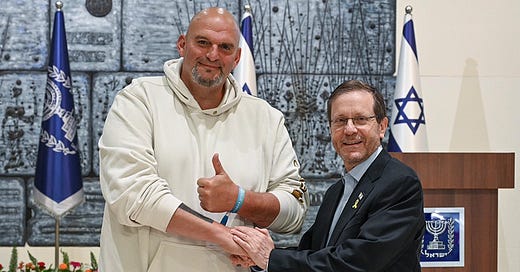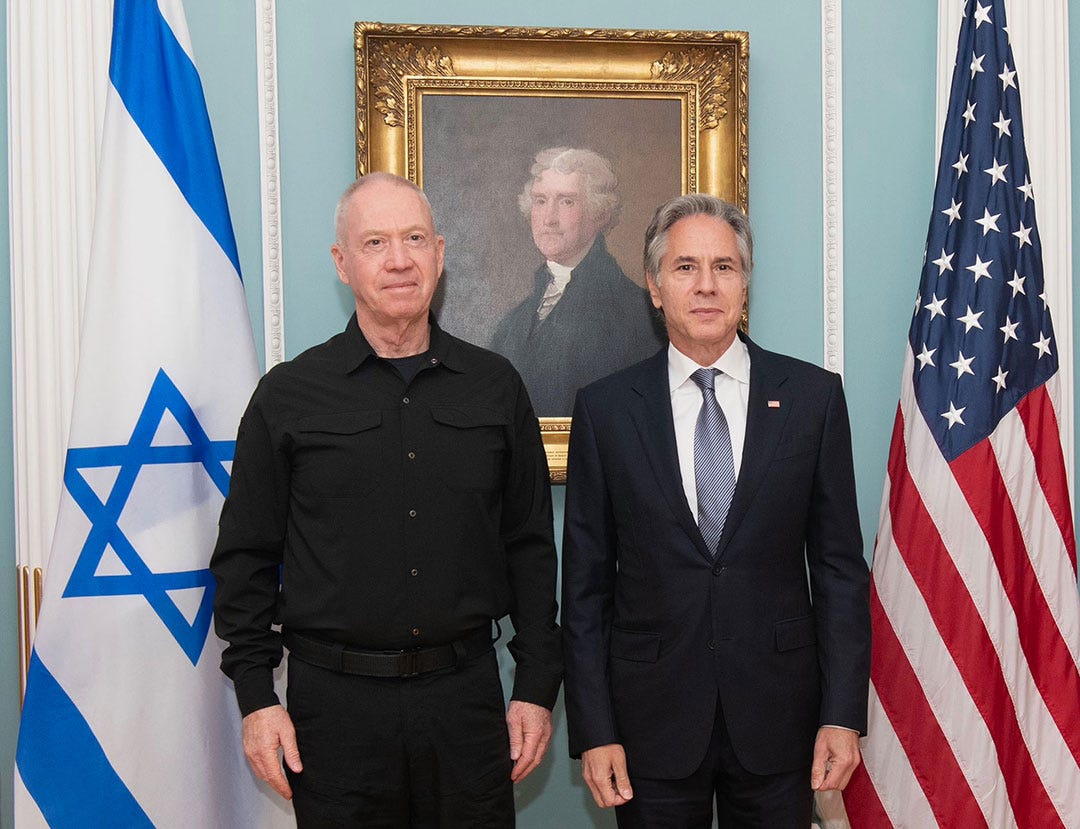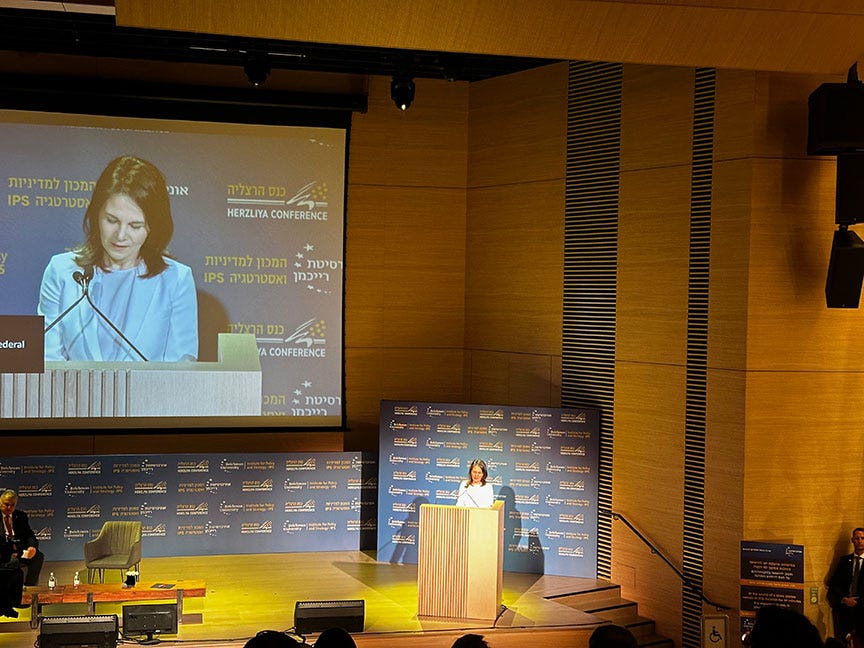DAY 263 OF THE WAR: Supreme Court Orders the Government to Draft Ultra Orthodox, Gems from the Herzliya Security Conference
Tel Aviv Diary, June 25, 2024
This morning, Israel’s Supreme Court issued its long-awaited decision regarding the military draft of the ultra-Orthodox. The unanimous (9-0) ruling stated that there is no legal basis for an ultra-Orthodox exemption from the draft and directed the government to begin their conscription. Additionally, the court mandated the government halt financial support to Yeshivas in which ultra-Orthodox students register to avoid the draft. The Army plans to draft an additional 3,000 ultra-Orthodox soldiers by the end of the year and another 5,000 next year from a total pool of 63,000 ultra-Orthodox youth who had previously been exempt.
The political consequences of the High Court’s ruling are still uncertain. Previously, the ultra-Orthodox threatened to withdraw from the government if their youth were drafted. Today, after the fact, political leaders are more cautious in their remarks. While they express a desire to bring down the government, they are skeptical that any future government will better serve their interests. For now, they will wait to see if legislation can be passed that would grant some of their children exemptions. The Ultimate decisions may not be in the hands of the ultra-Orthodox politicians but rather their Rabbis, who may not make a rational political decision.
The Supreme Court's decision is historic, as it marks the first time the Court has ordered the drafting of all ultra-Orthodox youth. One commentator noted that the decision reflects a significant shift that has occurred since October 7th. Prior to the war, the ultra-Orthodox were more determined to keep their youth out of the Army than the rest of the country cared about forcing the issue. However, now, due to the urgent need and exceptionally high cost of the war, the rest of the country is just as determined to see the ultra-Orthodox serve as the overwhelming majority of ultra-Orthodox are resolute in their refusal to serve.
THE NORTH
It was another relatively quiet day in the North. Over the last ten days, the number of projectiles fired by Hezbollah has steadily decreased. Today, there were only two drone strikes. Despite talk of war in the North, I believe the likelihood of a full-scale conflict is diminishing—if those chances were ever significant to begin with. I hope I am not proven wrong.
CRISIS WITH U.S.
The crisis with Washington appears to be easing. The joint strategic meeting on Iran has been rescheduled, and the meetings conducted with Gallant are reported to have been productive. It has also become clear that the perceived “slowdown” in American arms deliveries was primarily due to the fact that, at the onset of the war, the US rushed everything they could from American stocks to send to Israel. Now, new shipments are being processed in the usual process, which also competes with Ukraine's needs.
The US has made clear that it will expedite deliveries should the need become critical again. Furthermore, there are reports tonight that Netanyahu is planning to deliver a very moderate speech in Washington, which might include some concessions to the Palestinians. We will see what unfolds, but a Washington insider at the Herzliya Conference said that if Netanyahu arrives in DC “bearing gifts,” Biden will invite him to the White House
.
HERZLIYA SECURITY CONFERENCE
The Herzliya Conference, the annual security summit organized by the Institute for Policy and Strategy (IPS), occurred yesterday and today at Reichman University. The Conference opened with a rather pessimistic overview by General (res.) Amos Gilead, Executive Director of the IPS. The conference continued with a partial screening of the film “Screams Before the Silence,” followed by a short video address by Sheryl Sandberg and a brief discussion with Joey Low, who financed the film. This presentation was followed by a heartbreaking speech from Meirav Leshem Gonen, mother of hostage Romi Gonen. The next session featured Michal Herzog, the wife of the President, who primarily spoke about the hostages but also shared her experiences as Israel’s First Lady during this difficult time.
The next session featured journalist Ben Caspit interviewing former IDF Chief of Staff Eisenkot. I wrote extensively about Eisenkot’s remarks in last night’s update. To add a few additional points, Eisenkot disclosed that both he and Gantz had favored entering Rafah at the same time the Army entered Khan Younis. Eisenkot said that Bibi blocked the plan, in his opinion, for political reasons, preferring not to end the war too quickly. The interview concluded on a very personal note when Eisenkot spoke about the impact of losing his son in the war, which moved everyone in the hall.
In the following session, Ben Caspit moderated a panel that included General (res.) Noam Tibon, Amos Gilead, and Tamir Pardo (former head of the Mossad). Caspit asked the panel for a one-word answer to the question: “Is Israel facing an existential threat?" All three responded affirmatively with a single word: "Yes." After that sobering response from three highly informed individuals, there was a moment of stunned silence. Hearing confirmation from such knowledgeable people was unnerving. The panelists agreed that Israel is at a critical crossroads: one path leads to darkness, isolation, and potential disaster, while the other offers hope to resolve the current ongoing crisis.
The panelists all believed that continuing current policies, especially those promoted by Ben-Gvir and Smotrich, might result in the building of Israeli settlements in Gaza— which could lead to a full-fledged conflagration in the West Bank and complete international isolation, including standing alone against a nuclear Iran. The alternative, they agreed, is to follow some version of the Biden plan, implementing a ceasefire in Gaza and integrating Israel into a regional alliance that includes Saudi Arabia. However, this approach would require Israel to make concessions to the Palestinians, which the panelists doubted the current government could achieve.
Pardo made several other important comments. He believes that the Army Chief of Staff should have resigned soon after October 7th. Pardo also shared a distressing anecdote from the 2014 Operation Protective Edge, when he was head of the Mossad. From the first day of the war, Gantz, who was IDF Chief of Staff, repeatedly pressed Netanyahu to define the objectives of the war but never received a response. Additionally, Pardo expressed his embarrassment as an Israeli hearing Netanyahu attack Biden over arms supplies.
One recurring theme in these sessions, including those held today, was the Israeli government's significant failure in strategic planning.
The evening sessions were a bit more optimistic. U.S. Ambassador Jack Lew said that an agreement with Sunni Arab states and a demilitarized Palestinian state would not constitute a victory for Hamas and reassured Israel that it should not fear such an agreement. Following Ambassador Lew, German Foreign Minister Annalena Baerbock concluded the evening. Notably, Baerbock is the first female foreign minister—preceded by a female deputy foreign minister over a decade ago—and she was impressive.
During her address, Baerbock reflected on her visit at the beginning of the war. The Foreign Minister stated that the German government views Israel’s security to be of primary importance. She tried to imagine one of her children living in Nahal Oz. As the war progressed, she also thought about how she would feel if one of her children was in Gaza. Baerbock expressed the belief that Israelis can only live in peace if Palestinians are able to live in peace. However, Palestinians can never live in peace unless Israelis can live in security.
Baerbock then discussed her efforts with other leaders to end Hamas's rule in Gaza, which she views as essential. Lastly, she spoke about her upcoming visit to Lebanon, clearly identifying Hezbollah as the aggressor and expressing hope that she could contribute positively to the situation. At the end of her speech, she was the only person of the day to open the floor to questions from the audience.
Tomorrow, I will write an overview of the conference's second day.
FETTERMAN IN ISRAEL
Senator John Fetterman is visiting Israel. Here’s what the Senator said when he met President Herzog:
I don't really believe I should be thanked for just doing my job. It's been a very easy and clear choice throughout all of this, through everything your nation has been through after 10/7. I've always wanted to be a very consistent voice throughout all this
.
A WORTHWHILE READ
Here's an excellent article in today's Washington Post by Max Boot, a long-time supporter of Israel:
https://www.washingtonpost.com/opinions/2024/06/25/israelis-gloom-gaza-war-hamas-hezbollah/
FROM THE TAUB REPORT
The Impact of War on Unemployment and Social Benefits in Israel
The outbreak of war had significant repercussions on the economic and social welfare landscape in Israel, notably affecting unemployment benefits and support provided under the Victims of Terrorism Law.
Increase in Unemployment Benefit Recipients
Before the war, the number of unemployment benefit recipients was relatively low, although it was experiencing a slight upward trend. However, in October 2023, the number of recipients more than doubled as a direct consequence of the conflict. This spike in unemployment benefits was indicative of the broader economic disruption caused by the war. From December 2023 onwards, there has been a gradual decline in the number of recipients, reflecting a slow but steady recovery in the job market
.
Rise in Support for Victims of Terrorism
In addition to the surge in unemployment benefits, there was a dramatic increase in the number of individuals receiving care under the Victims of Terrorism Law. This law provides support and benefits to those affected by terrorist activities. The determination of these individuals' permanent status and the level of benefits they will receive is slated for a later stage as the National Insurance Institute continues to assess the long-term needs arising from the conflict.
The National Insurance Institute has also implemented specific measures to support those who were forced to evacuate their homes. This includes providing a housing grant to individuals who voluntarily evacuated to accommodations not funded by the state and a grant to evacuees who returned to their homes. These grants aim to alleviate some of the financial burdens faced by those displaced by the war.
Decline in Hotel Evacuees
In the initial months of the war, the number of evacuees staying in hotels was between 70,000 and 80,000, with a significant proportion of these evacuees coming from the southern regions of Israel. Over time, the number of evacuees in hotels has declined, especially among residents from the South. This reduction reflects the efforts to find more permanent housing solutions and the gradual return of some evacuees to their homes
.
In summary, the war has led to a notable increase in the number of people relying on unemployment benefits and social support mechanisms. The government's response includes measures to provide immediate relief to those affected and plans for long-term support and recovery. The situation highlights the broader economic and social impacts of the conflict on the Israeli population.
Long Term Care in Israel
Israel is among the leaders in the rate of elderly long-term care (LTC) benefit recipients. In recent years, the number of elderly individuals who need LTC and receive benefits from the National Insurance Institute has dramatically increased, doubling between 2012 and 2022, compared to a 40% increase in old-age pension recipients. This surge lacks a clear explanation, and it's unknown if it correlates with a faster deterioration in functioning. Additionally, the number of LTC benefit recipients through health funds’ LTC insurance plans increased by two and a half times during this period. Israel has one of the highest proportions of individuals aged 65+ receiving LTC in the OECD, primarily due to the high rate of community-based care. Conversely, Israel has one of the lowest rates of patients hospitalized in nursing homes
.
BUSINESS
The Israeli company JFrog, which developed a system for automatic security updates for software developers, announced an agreement to acquire the Israeli company Qwak for approximately $230 million. Qwak developed a platform for managing machine learning processes (MLOps – Machine Learning Operations) based on artificial intelligence.
GOOGLE MAKES A LONG-TERM COMMITMENT
Amot and Gav Yam will lease approximately 60,000 square meters to Google, in a shell condition, on the upper part of the ToHa2 Tower. The building is jointly owned by Amot (+4.09% 1554) and Gav Yam (+5.83% 2485). Additionally, several hundred parking spaces will also be leased for a rental period of 10 years (with a one-time exit option at the end of five years) in exchange for a total annual rent of 115 million shekels, indexed to the May 2024 index.
Construction of the ToHa2 Tower is currently underway, with approximately 40% of the structural work completed according to the planned schedule. The exterior and systems work of ToHa2 are also progressing as planned, with the construction and receipt of Form 4 expected to be completed by the end of 2026. Therefore, the lease agreement with Google is expected to take effect in the first quarter of 2027.
–––––∞–––––∞–––––∞–––––∞–––––∞–––––∞–––––∞–––––
A PIECE OF HISTORY
The Kahan Commission
The Kahan Commission, officially known as “The Commission of Inquiry into the Events at the Refugee Camps in Beirut,” was established by the Israeli government on September 28, 1982, to investigate the Sabra and Shatila massacre. This tragic event occurred from September 16 to 18, 1982, during the Lebanon War, when Phalangist Christian militias entered Palestinian refugee camps and killed numerous civilians. Led by Chief Justice Yitzhak Kahan, the commission presented its findings on February 8, 1983.
The Commission's investigation focused on the massacre itself, the involvement of Israeli forces, and the decision-making process that led to these events. While it found that the Phalangist militias were directly responsible for the killings, it also determined that Israeli authorities bore indirect responsibility for failing to foresee and prevent the massacre. The Commission criticized several high-ranking Israeli officials, including Defense Minister Ariel Sharon, who was found to bear personal responsibility for ignoring the danger of revenge actions by the Phalangists and failing to take appropriate preventive measures.
The report highlighted intelligence failures and the need for proper communication within the Israeli Defense Forces (IDF). It also emphasized the ethical and moral responsibility of the Israeli government and military to protect civilian lives, deeming their failure to do so a severe lapse in moral judgment. As a result of the commission's findings, it recommended the dismissal of Ariel Sharon from his post as Defense Minister and issued severe reprimands to other senior officials. The Commission also called for changes in Israeli military procedures and policies to prevent similar incidents in the future.
My weekly radio show











The Orthodox will adjust to serving in the military. In time it will seem 'normal'.